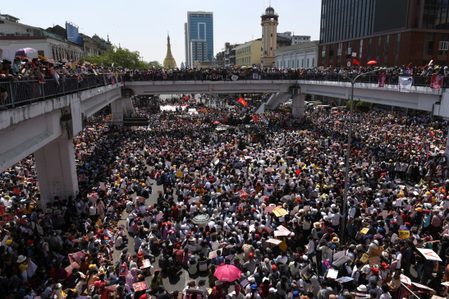SUMMARY
This is AI generated summarization, which may have errors. For context, always refer to the full article.
![[OPINION] EDSA at 35, or why we’ve lost that lovin’ feelin’](https://www.rappler.com/tachyon/2021/03/EDSA-TL.jpg)
I decided to write this piece after watching city officials and a few senior government men commemorate the 35th anniversary of the 1986 EDSA Revolution. I also read a sizeable number of essays posted online, many of them reflecting on how and why the Revolution has failed us.
Thirty five years ago, the EDSA Revolution was our shining moment as a people. Today, it seems like a faint memory, just another special non-working holiday, and an occasion for an annual outpouring of frustration, contempt, or bitter recrimination. It is openly despised by a growing segment who reject its legacy or feel betrayed by it. Over time, the grand event has slowly lost the love it deserves.
This year’s commemoration was, in all respects, the most tepid I have seen. Organizers justified the low-key and bland affair as a concession to the pandemic and the strict policies on social distancing we are supposed to follow. (Of course, they forgot to mention that since 2016, commemorating the EDSA Revolution has not been high on the administration’s priorities.) But the emptiness of the highway where some 2,000,000 Filipinos had once gathered to remove a dictator underscored the growing isolation of the event from our collective memory.
Why has it come to this?
Looking back with the benefit of hindsight, reality checks, and strong wine, perhaps it was because we were naive.
I was 24 when EDSA happened. Despite being jaded and skeptical by training and disposition, I still had a bit of youthful idealism and believed, like most witnesses or participants, that a revolution – generally bloodless – could upend the structures of injustice, and that we could forego self-interests and be united if we just hold hands and sing “Handog ng Pilipino sa Mundo.” Boy, were we wrong.
We expected too much but worked too little to make the promise a reality. We oversold the significance of the event to ourselves, and were terribly frustrated when the supposedly democratic regimes that followed Marcos miserably underdelivered.
EDSA would swallow its children, only to regurgitate some of them. Yes, EDSA led to a restoration of democracy, of our rights and liberties, but it also restored the old political elite and spawned new ones. And we allowed it, or tolerated it as part of the new democratic space.
Eventually, unity would give way to factions and the cause of the nation would yield to political ambitions and business interests, at times both of them reaching a confluence. The people, in whose name the Revolution was mounted, became passive observers, bystanders to the high-stakes power play at the top reaches of government. If the years after EDSA were a long dinner party, the people would be in the servant’s quarters, scraping for crumbs. It was business as usual for the political elite.
This widespread disenchantment has its roots in the failure of each succeeding administration to improve the lives of the people, to lift them from the curse of hunger, poverty, and destitution. We had our rights, but most had no rice or bread. We exercised our freedoms to the fullest, but ordinary Filipinos did not enjoy the freedom from poverty and want. Those who dared raise their voices in protest were treated in the same heavy-handed manner employed by the ousted dictatorship.
This would prove to be putty in the hands of forces and personalities who cloaked themselves in the color and rhetoric of EDSA, but worked to undermine its legitimacy, values, and legacy.
Yellow was once the color of courage. The “L” hand sign was the symbol of defiance. They should have belonged to the people as revered icons, but they were transformed into signifiers of elitist politics. Today, these icons of Revolution are regarded as symbols of elitist indifference.
It is no wonder that every election, the people would look for someone who could save them miraculously from the oppression of poverty in the same manner that EDSA succeeded as a result of divine intervention rather than an exercise in collective will. The intense infighting among the political elites since 1986 gave way to a frustration with politics as usual and paved the way for the election of perceived outsiders, despots in disguise who use the very institutions of democracy to undermine it.
We have also failed to ingrain among the youth a deeper respect and understanding of the sacrifices made, how high the stakes were during those days at the barricades. The freedoms they enjoy and take so casually today were once as precious as air, and we had to fight in order to breathe it. The highly-funded effort to revise history and rehabilitate the image of the dictator would not have gained considerable traction had it not been for this egregious oversight.
Perhaps its not too late to remind ourselves and future generations that the rewards of EDSA will not come in an instant, that it will take consistent and concerted nurturing, and demand from us a lifetime of dedicated work and vigilance.
While there are those who see EDSA as betrayal, a failure, or an opportunity lost, I would rather see it as work in progress. We may run into bumps and obstacles, we may get lost and distracted, but what is important is we find our way back home. We must always look to our North Star.
Until then, we must live with the fact that “Bayan Ko” is a song on a videoke playlist. – Rappler.com
Joey Salgado is a former journalist, and a government and political communications practitioner. He served as spokesperson for former Vice President Jejomar Binay.
Add a comment
How does this make you feel?

There are no comments yet. Add your comment to start the conversation.